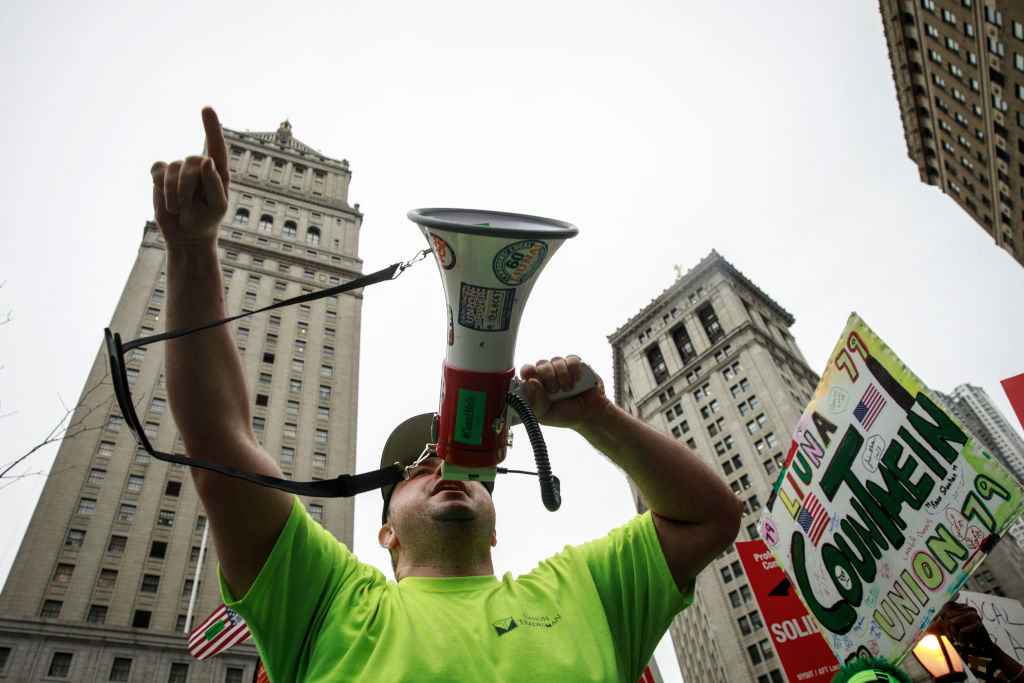Over the summer, the Supreme Court ruled that public sector unions cannot require non-members to pay the fees that fund collective bargaining efforts, in American Federation of State, County and Municipal Employees v. Janus.
While publicly defiant, the Los Angeles Times reported that AFSCME privately estimated that it could lose half of its members under the ruling.
Public sector unions like AFSCME and the Service Employees International Union were among the last important labour organisations in the country and the Janus ruling left them reeling. In Harper’s, Garret Keizer writes that ‘American workers may soon be engaged in a virtual Armageddon with capital’. Unions are on the ropes and conservative groups are jubilant, like the State Policy Network, which had websites up and running soon after the decision that explained how workers could opt out of the payments.
But it’s time for conservatives to reconsider unions. In fact, it’s time for a conservative labour movement.
In fact, President Donald Trump’s stated desire to turn the Republican Party into a workers’ party may provide that opportunity, despite criticisms that his economic policies help the wealthy instead. But he remains popular among the working class voters who elected him. This popularity could help a conservative labour movement grow. While seeming strange at first, the idea should not be. Conservatives have managed to appeal to working class voters since the days of Disraeli and in the United States unions helped protect workers from socialism by helping them advance within the free enterprise system. Labour leaders like George Meany and Peter Brennan opposed Communism and in 1965 William F Buckley, Jr recorded in his book The Unmaking of a Mayor that working class Catholics disliked the social liberalism of Lyndon Johnson and the growing power of the (college-educated and middle-class) new left.
But rather than build on common ground and convert unions, their money and their organisation away from the creeping leftism of the post-Johnson Democratic Party, American conservatives preferred to press the attack and so labour was driven deeper into the Democratic camp. While Janus may hurt AFSCME and the SEIU in the short run, what remains of American organised labour will be even more committed to the radical socialism of Sen. Bernie Sanders and New York’s 14th Congressional District Democratic nominee, Alexandria Ocasio-Cortez.
A party that puts law and order in its platform should not tolerate wage theft, but it does. Workers in farms or warehouses should not have to wear diapers because they are not allowed bathroom breaks. Silicon Valley computer programmers should be free to sell their labour to the highest bidder, not pressured into signing non-compete agreements or be victimised by collusion. These are just a few of the abuses unions could combat.
The shape of a conservative labour movement has already been envisioned, in part, by writers such as Hilare Belloc and Noel Skelton. In 1923 Skelton coined the phrase ‘property-owning democracy’ – which he uses to mean capital rather than real estate – and wrote that there is a fundamental relationship between a stable society and private property. In the past it meant that only owners of property could participate in politics, but for Skelton, since all citizens could vote, they should all own property. Belloc argued that workers could become owners of capital through co-ops or on a principle similar to a Medieval guild.
Conservative labour unions could play a role not only by advancing worker interests under freedom of association and contract, but by leveraging dues to support employee stock ownership plans and even purchasing enough shares to ensure worker representation on corporate boards, in a manner similar to the activism promoted by Boston University Law School professor David Webber. They could also provide benefits and services to members, from health insurance to professional training, rather than confrontation. With that emphasis on self-help, conservative unions could help revive Tocquevillian democracy, reducing dependence on the state.
A labour movement that cooperates with conservatism to bolster and nurture the aspirations of workers to prosperity and security would not just help broaden the benefits of a strong stock market. It would reduce the drive to radicalism.

























